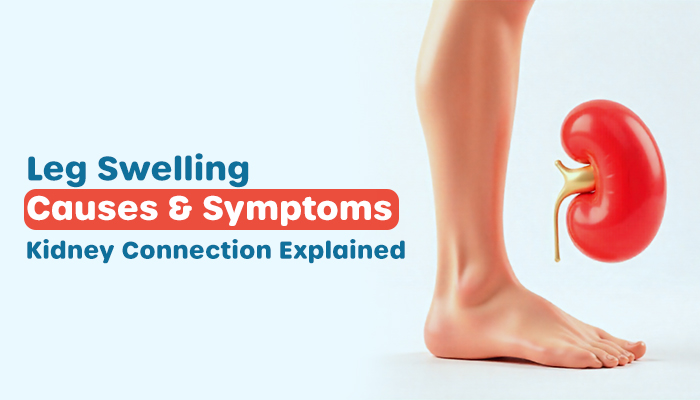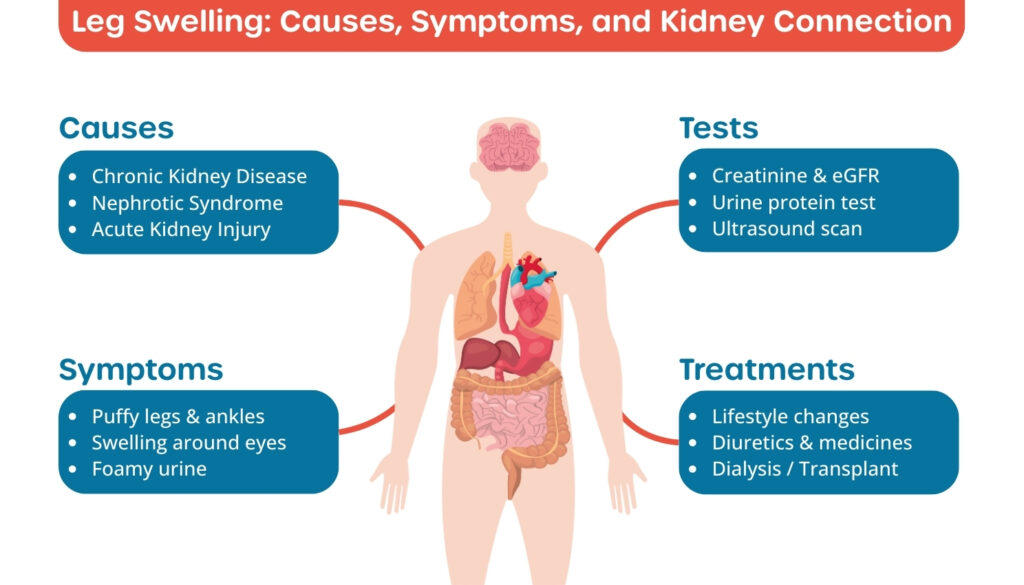You didn’t expect something as ordinary as leg swelling to raise questions about your kidney health. After all, isn’t it usually blamed on long work hours, age, or simply standing too long? These are the most common assumptions patients make, right before they ask, “Is this serious?” or “Could it really be my kidneys?”
Leg swelling isn’t always harmless, it can be one of the earliest signs of kidney disease, especially when your kidneys fail to remove excess sodium and fluid effectively. Left unchecked, this imbalance can indicate conditions like chronic kidney disease, nephrotic syndrome, or even the onset of kidney failure.
At Shinon Healthcare, a trusted healthcare partner, we help patients access advanced kidney care across leading hospitals in India, Malaysia, Thailand, UAE, Turkey, and Egypt. From connecting with renowned nephrologists to guiding treatment decisions, our role is to simplify access to world-class care for those who need it most.
In this blog, we’ll explain the real leg swelling causes, how to recognize leg swelling symptoms, and the right approach to leg swelling treatment, so you know when it’s time to take action.
Understanding the Connection Between Kidneys and Swelling
The kidneys act as the body’s natural filters, regulating sodium retention, fluid balance, and waste removal. When their function declines, extra fluid builds up in the body and reveals itself as visible leg swelling symptoms.
- Fluid overload leads to heaviness in the legs and ankles.
- Pitting edema becomes noticeable when pressure leaves an indentation on the skin.
- Patients may also experience foamy urine (proteinuria), high blood pressure, and fatigue.
This link between renal function and leg swelling makes early nephrology evaluation crucial. Identifying the problem at this stage can prevent progression to chronic kidney disease or kidney failure.
Common Kidney-Related Causes of Leg Swelling
Several kidney conditions can contribute to leg swelling causes and symptoms:
- Chronic Kidney Disease (CKD): When kidneys slowly lose their strength over time, extra fluid builds up in the body.
- Nephrotic Syndrome: Too much protein leaks into urine, which makes the legs, feet, and even the face look puffy.
- Acute Kidney Injury (AKI): The kidneys suddenly stop working properly, leading to quick swelling.
- Polycystic Kidney Disease (PKD): Cysts (fluid-filled sacs) form inside the kidneys and stop them from working well.
- Kidney Failure: An advanced stage where dialysis or transplant becomes necessary to manage symptoms.
Each of these conditions reflects impaired renal function and fluid imbalance, explaining the direct link between edema and kidney disease. Recognizing these conditions early can help prevent progression to severe kidney complications. In short, when kidneys cannot clear waste and balance fluid, swelling in the legs is one of the first signs.
Other Possible Causes of Swelling (Not Always Kidney-Related)
While kidneys are are a common reason, leg swelling causes can also come from other health issues:
- Heart problems (CHF): When the heart is weak, fluid backs up and collects in the legs.
- Vein problems (venous insufficiency or DVT): Poor blood flow or a clot can make the legs swell.
- Liver disease (cirrhosis): The liver cannot make enough proteins, leading to swelling.
- Lymphedema: Damage to the lymph system causes firm, long-lasting swelling.
- Pregnancy or medicines (like painkillers or steroids): Can cause short-term swelling.
Because so many different conditions can look alike, it’s important to see a doctor instead of guessing the cause.
Signs That Your Swelling May Be Kidney-Related
Watch for these red flags:
- Swelling in both legs, feet or around the eyes.
- Swelling that worsens in the evenings.
- Foamy urine caused by protein leaking into urine.
- High blood pressure with tiredness or nausea.
- Family history of kidney disease.
If these leg swelling symptoms continue, they may indicate an underlying kidney disorder. Getting checked early by Best Kidney Transplant Surgeon in Delhi can prevent complications.
What To Do If You Notice Persistent Swelling
Leg swelling treatment depends on the cause:
- Get tested: Blood tests like creatinine and eGFR show kidney function. A urine test checks for protein, and an ultrasound helps assess the kidneys.
- Lifestyle changes: Reduce salt intake, manage blood pressure, stay physically active.
- Medication: Doctors may prescribe diuretics (to remove excess fluid) or medicines that reduce protein loss in urine.
- Dialysis or Kidney Transplant: In severe kidney failure, treatment may involve dialysis or a kidney transplant.
Early consultation with a nephrologist can identify the exact cause of swelling and stop the condition from getting worse.
How Shinon Global Helps Patients With Kidney Issues
At Shinon Healthcare, we serve as a trusted healthcare consultancy and medical partner, guiding patients through every stage of care. Recognized as the Best Medical Tourism Company in India, we support individuals across India, Malaysia, Thailand, UAE, Turkey, and Egypt with seamless access to advanced kidney treatments.
- 24×7 guidance: Round-the-clock support for patients seeking nephrology, dialysis, or kidney transplant care.
- Top experts: Direct access to the Best Kidney Transplant Surgeon in Delhi and leading nephrologists across our partner hospitals.
- Hospital partnerships: Collaboration with renowned hospitals like Fortis and others, offering state-of-the-art technology for diagnostics and surgery.
- Treatment coverage: Full range of kidney-related services, including chronic kidney disease management, dialysis planning, transplant evaluation, and post-transplant care.
- Logistic assistance: Suggestions for flights, accommodation, and other essentials, patients choose the option that best fits their requirements and budget.
- Global patient focus: Tailored pathways for patients traveling from the Middle East, Africa, and Southeast Asia to receive seamless care.
- End-to-end support: From hospital selection and cost estimates to visa facilitation and follow-up consultations, everything is streamlined.
For international patients struggling with leg swelling causes linked to kidney disease, Shinon Global ensures world-class care without confusion or delay.
Conclusion
Swelling in your legs is not always harmless, it may be a sign of kidney disease. Persistent or worsening edema should never be ignored. With the right diagnosis, treatment, and expert nephrology care, recovery and long-term health are possible.
At Shinon Global, we combine compassion with expertise to help patients access trusted specialists worldwide. If you are experiencing leg swelling symptoms or need advanced leg swelling treatment, connect with us today to find the right solution.
Reach out to Shinon Healthcare, your trusted partner for safe, effective kidney care.
FAQs
Can leg swelling be the first sign of kidney disease?
Ans. Yes, fluid retention is often an early warning sign of CKD or nephrotic syndrome.
When should I see a doctor for swollen legs?
Ans. If swelling lasts more than a few days, is painful, or is accompanied by urine changes or high blood pressure.
Does dialysis cure swelling completely?
Ans. Dialysis helps remove extra fluid but long-term management depends on kidney health or transplant.
Can diet changes reduce kidney-related swelling?
Ans. Yes, limiting sodium and processed foods can ease fluid retention.
Are swollen legs in children a kidney problem too?
Ans. Yes, conditions like nephrotic syndrome in children can cause noticeable swelling.

